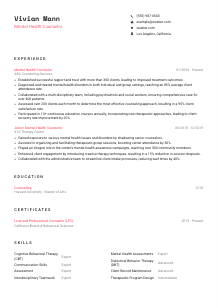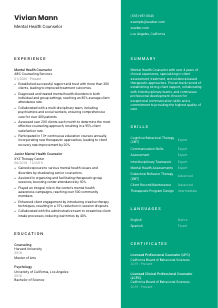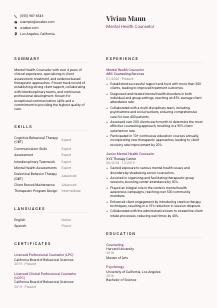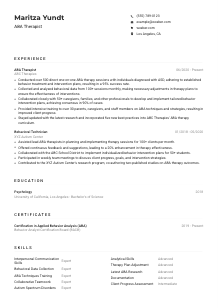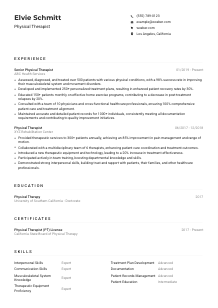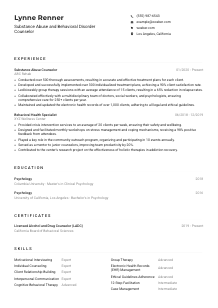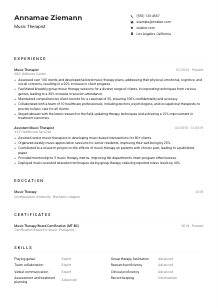Mental Health Counselor Resume Example
Navigating emotional landscapes, but your resume feels lost in thought? Examine this Mental Health Counselor resume example, sculpted with Wozber free resume builder. Uncover how to articulate your empathy and guidance to resonate with job criteria, presenting a professional profile as reassuring and enriching as your counseling sessions!
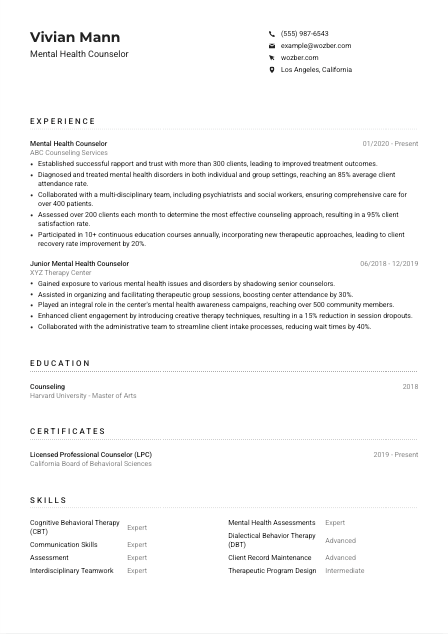
How to write a Mental Health Counselor Resume?
Embarking on the path to secure a Mental Health Counselor position? Your resume is not just a document; it's a testament to your dedication, expertise, and the profound impact you aim to make in the lives of those you counsel. The intricate dance of matching your resume to a job description requires a deep understanding of what makes you stand out.
Using the Wozber free resume builder, this guide is meticulously crafted to help you navigate through creating an ATS-compliant resume, tailored perfectly to your dream Mental Health Counselor role. Let's transform your professional narrative into an irresistible invitation for hiring managers to want to know more about you.
Personal Details
Your journey on the resume starts with personal details, the cornerstone of your professional introduction. This section, seemingly simple, requires careful consideration to align perfectly with the Mental Health Counselor position. Let's dive deep into personalizing each detail to set the right tone from the get-go.
1. Brand Yourself with Your Name
Consider your name as your personal brand emblem. Use a clear, professional font, allowing it to stand proudly at the top of your resume. This isn't just a header—it's the first step in asserting your presence in the mental health field.
2. Align Your Title to The Role
Right below your name, echo the job title you're pursuing: "Mental Health Counselor." This immediate alignment shows you're not just looking for any job—you're dedicated to this specific role, resonating with the employer's needs.
3. Get in Touch Easily
Ensure your contact information (phone number and email) is up-to-date and professional. This means avoiding whimsical email addresses; stick to a format that includes your name, signaling your seriousness about your career.
4. Address Matters
Since the position requires being located in Los Angeles, California, explicitly stating this location in your resume confirms your eligibility without any need for assumptions. It's a small detail that swiftly checks a crucial box for your potential employer.
5. A Professional Profile Counts
If you have a LinkedIn profile or a personal website that showcases your professional achievements or portfolio, include it. Ensure it's polished and mirrors the dedication and expertise reflected on your resume. This is your chance to show, not just tell, your professional story.
Takeaway
Your personal details serve as the prologue to your professional narrative. They invite the hiring manager into your world, giving them not just the means to contact you, but a glimpse into your professional demeanor. Align them meticulously with what the Mental Health Counselor role seeks, and you're off to a promising start.





Experience
The experience section is where your professional journey comes to life, demonstrating your alignment with the Mental Health Counselor role. It's more than just a list—it's evidence of your expertise, your successes, and most importantly, how these translate into your future role.
- Established successful rapport and trust with more than 300 clients, leading to improved treatment outcomes.
- Diagnosed and treated mental health disorders in both individual and group settings, reaching an 85% average client attendance rate.
- Collaborated with a multi‑disciplinary team, including psychiatrists and social workers, ensuring comprehensive care for over 400 patients.
- Assessed over 200 clients each month to determine the most effective counseling approach, resulting in a 95% client satisfaction rate.
- Participated in 10+ continuous education courses annually, incorporating new therapeutic approaches, leading to client recovery rate improvement by 20%.
- Gained exposure to various mental health issues and disorders by shadowing senior counselors.
- Assisted in organizing and facilitating therapeutic group sessions, boosting center attendance by 30%.
- Played an integral role in the center's mental health awareness campaigns, reaching over 500 community members.
- Enhanced client engagement by introducing creative therapy techniques, resulting in a 15% reduction in session dropouts.
- Collaborated with the administrative team to streamline client intake processes, reducing wait times by 40%.
1. Break Down the Job Description
Start with the job description. Highlight key phrases like "evidence-based therapeutic approaches", "interdisciplinary teamwork", and "client assessment". Your resume should speak directly to these points, showing you're not just a candidate—you're the candidate.
2. Structure with Precision
Structure your experiences chronologically, focusing on roles that align with mental health counseling. For each, clearly state your position, the company, and the duration of employment. This structured approach not only keeps information digestible but highlights your career trajectory.
3. Accomplishments Speak Volumes
Rather than simply listing duties, focus on accomplishments. Use action words and quantify achievements where possible. For instance, "Established successful rapport with over 300 clients, leading to improved treatment outcomes", demonstrates the direct impact of your work.
4. Quantify Your Impact
Whenever possible, attach numbers to your achievements. Quantifying your accomplishments gives a tangible scale to your impact, like "assessed over 200 clients each month", immediately illustrating your capability to handle significant workloads efficiently.
5. Relevance is Key
Tailor your experience section to omit unrelated roles. Focus on responsibilities and achievements that showcase your qualifications as a Mental Health Counselor. Every sentence should contribute to building a compelling case for your candidacy.
Takeaway
Craft your experience section as a narrative of your professional journey, emphasizing how each chapter has prepared you for the Mental Health Counselor role. Make it as compelling and relevant as possible, ensuring it captures the essence of your career and how it aligns with the needs of your prospective employer.
Education
In mental health counseling, your educational background is not just a requirement—it's the bedrock of your professional credibility. Let's navigate shaping this section to reflect the targeted depths of knowledge and commitment to the field required by your dream job.
1. Spotlight the Key Requirement
The role explicitly requires a "Master's degree in Counseling, Psychology, or a related field from an accredited program." Ensure your highest degree is highlighted prominently, directly answering one of the job's primary demands.
2. Clarity and Precision
Maintain a clear structure: Start with your highest level of education, followed by the degree, the institution, and your graduation year. This straightforward format respects the hiring manager's time by getting straight to the point.
3. Degree Relevance
If your degrees directly match the job requirements, as in having a "Master of Arts in Counseling", make this the centerpiece of your education section. It's a direct hit on the job's checklist, significantly bolstering your candidacy.
4. Highlight Pertinent Courses
If your education includes specific coursework related to mental health counseling, such as "Cognitive Behavioral Therapy" or "Dialectical Behavior Therapy", listing these can further underscore your preparedness for the demands of the position.
5. Additional Accolades
Include any relevant honors, scholarships, or extracurricular involvement that demonstrates your dedication to the field of mental health. However, keep the focus on recognitions that bolster your credentials as a future Mental Health Counselor.
Takeaway
Your education section is more than a list of degrees; it's a testament to your dedication to and foundation in mental health counseling. Craft this section to highlight the most relevant aspects of your education, directly linking your academic journey to the requirements of your dream job.
Certificates
In the Mental Health Counselor realm, certifications are more than accolades; they are vital validations of your expertise and commitment to continuous professional development. Here's how to ensure your certificates section adds substantial credibility to your resume.
1. Extract Pertinent Certifications
Begin by identifying certifications explicitly mentioned in the job description, such as the "Licensed Professional Counselor (LPC)" or "Licensed Clinical Professional Counselor (LCPC)". These are non-negotiables and should be prominently listed.
2. Quality Over Quantity
It's tempting to list every certification you've ever earned, but focus on those most relevant to the Mental Health Counselor role. This strategic choice ensures the hiring manager immediately sees your qualifications that matter most.
3. Date Sparingly
If certifications have a validity period, noting the date of achievement or renewal shows you're up-to-date in your field. This is especially crucial in a profession where continuous education reflects on your commitment to providing the best care.
4. Continuous Learning
Always be on the lookout for additional certifications that can bolster your proficiency and adaptability in the changing landscape of mental health counseling. Not only does this show dedication, but it also demonstrates a proactive approach to your professional development.
Takeaway
Your certificates are badges of honor showcasing your ongoing journey in professional growth. Highlight those that align with the Mental Health Counselor role, ensuring they serve as a reflection of your dedication to excellence and continuous learning in the field.
Skills
Your skills section is a compact showcase of your professional toolkit, distilled to its most potent form. It's where you align your unique blend of abilities with the needs of the Mental Health Counselor role, demonstrating your readiness to meet its demands.
1. Decode the Job Listing
Begin by analyzing the job description for both stated and implied skills. Keywords like "Cognitive Behavioral Therapy" and "interpersonal communication" are not just requirements; they are the languages of your profession. Ensure these are prominently featured in your skills section.
2. Match and Showcase
Directly match your skills with those listed in the job description. If it mentions "exceptional interpersonal and communication skills", and you excel in these areas, state them clearly. This direct correlation makes it easier for the hiring manager to see you in the role.
3. Organize for Impact
While you might have a broad range of skills, focus on those most relevant to the Mental Health Counselor position. Organizing your skills by relevance and expertise level not only prioritizes critical abilities but also demonstrates a thoughtful consideration of the role's needs.
Takeaway
Consider your skills section as the blueprint of your professional competence. It succinctly communicates the core of what you bring to the table, mapped directly to the landscape of the Mental Health Counselor position. Curate this section with intention, making it a compelling snapshot of your professional toolkit.
Languages
In the role of a Mental Health Counselor, your ability to communicate effectively is paramount. While proficiency in English is a given, additional languages can significantly enhance your communicative reach, especially in diverse communities. Let's polish your language skills to shine.
1. Priority to Job Requirements
The job lists "must be adept at English language communication" as a requirement. Therefore, English should be the first language you list, marked as ‘Native' or ‘Fluent', directly addressing this fundamental need.
2. Highlight Additional Languages
If you are fluent in languages beyond English, such as Spanish, list these next. This not only showcases your versatility but also your potential to connect with a broader spectrum of clients in a culturally diverse setting like Los Angeles.
3. Candid Proficiency Levels
Be honest about your proficiency levels in each language. This honesty reflects integrity and allows the employer to accurately assess your suitability for roles that may require bilingual or multilingual interactions.
4. Role-Relevant Linguistic Skills
Consider the specific needs of your role as a Mental Health Counselor. In communities with high non-English speaking populations, additional language skills can be a significant asset, enhancing your ability to connect with and aid a broader demographic.
5. Continuous Improvement
View language skills as an ongoing journey. Whether you're already multilingual or considering learning a new language, each step toward linguistic proficiency broadens your professional and personal horizons, opening new pathways for empathy and understanding in your counseling career.
Takeaway
Your linguistic proficiencies are more than just a section on your resume; they are a testament to your ability to communicate and connect. In the field of mental health counseling, where empathy and understanding are paramount, every language you speak is another bridge to healing. Showcase your linguistic skills as a reflection of your commitment to accessible and inclusive care.
Summary
The summary section is the heartbeat of your resume, a narrative distillation of your professional identity. It's where you encapsulate your qualifications, skills, and aspirations, setting the tone for everything that follows. Let's craft a summary that resonates with your Mental Health Counselor aspirations.
1. Essence of the Role
Begin by internalizing the essence of a Mental Health Counselor. Reflect on the core responsibilities and how your journey—your skills, experiences, and passions—aligns with them. This understanding will infuse your summary with authenticity and purpose.
2. A Strong Opening
Start with a powerful opening statement that defines who you are as a Mental Health Counselor. Mention your years of experience and areas of specialization right off the bat, establishing your credibility and setting the context for your expertise.
3. Highlighting Key Skills
Dive into the crux of what makes you exceptional. Identify key skills and accomplishments that answer the job's call. If the role emphasizes evidence-based therapeutic approaches, make sure to highlight your proficiency in CBT and DBT, demonstrating your direct relevance.
4. Conciseness is Virtue
While your career might be rich and full, your summary should be a teaser, not the full story. Aim for succinctness—3-5 impactful lines that invite the hiring manager to keep reading, eager to learn how you'll bring value to their organization.
Takeaway
Think of your summary as the elevator pitch of your professional narrative. It's your chance to impress upon the hiring manager not just your qualifications, but the unique mix of skills and experiences that make you the perfect fit for the Mental Health Counselor role. Craft it with the same care and empathy you bring to your counseling sessions, making it impossible for them to overlook your potential.
Launching Your Mental Health Counselor Journey
You're now equipped to sculpt a resume that does more than list your qualifications—it narrates your dedication and distinct suitability for the Mental Health Counselor role. With these tailored insights and the power of Wozber's free resume builder, including its ATS-friendly resume template and ATS resume scanner, your resume is poised to make an indelible mark. Remember, your resume is not just a document; it's the opening chapter of your next professional adventure. Let it be compelling, let it be true, and most importantly, let it be uniquely you.

- Master's degree in Counseling, Psychology, or a related field from an accredited program.
- Valid state license as a Licensed Professional Counselor (LPC) or Licensed Clinical Professional Counselor (LCPC).
- A minimum of 2 years of post-graduate clinical experience in a mental health setting.
- Strong proficiency in evidence-based therapeutic approaches, such as Cognitive Behavioral Therapy (CBT) or Dialectical Behavior Therapy (DBT).
- Exceptional interpersonal and communication skills, with the ability to establish rapport and trust with clients.
- Must be adept at English language communication.
- Must be located in Los Angeles, California.
- Conduct individual, group, and family therapy sessions to diagnose and treat mental health disorders.
- Assess clients' needs, situations, and difficulties to determine the appropriate counseling approach and techniques.
- Maintain accurate and up-to-date client records, in compliance with state and federal regulations.
- Collaborate with interdisciplinary teams and community organizations to provide comprehensive care and support for clients.
- Participate in ongoing professional development and supervision to ensure the highest quality of care.





